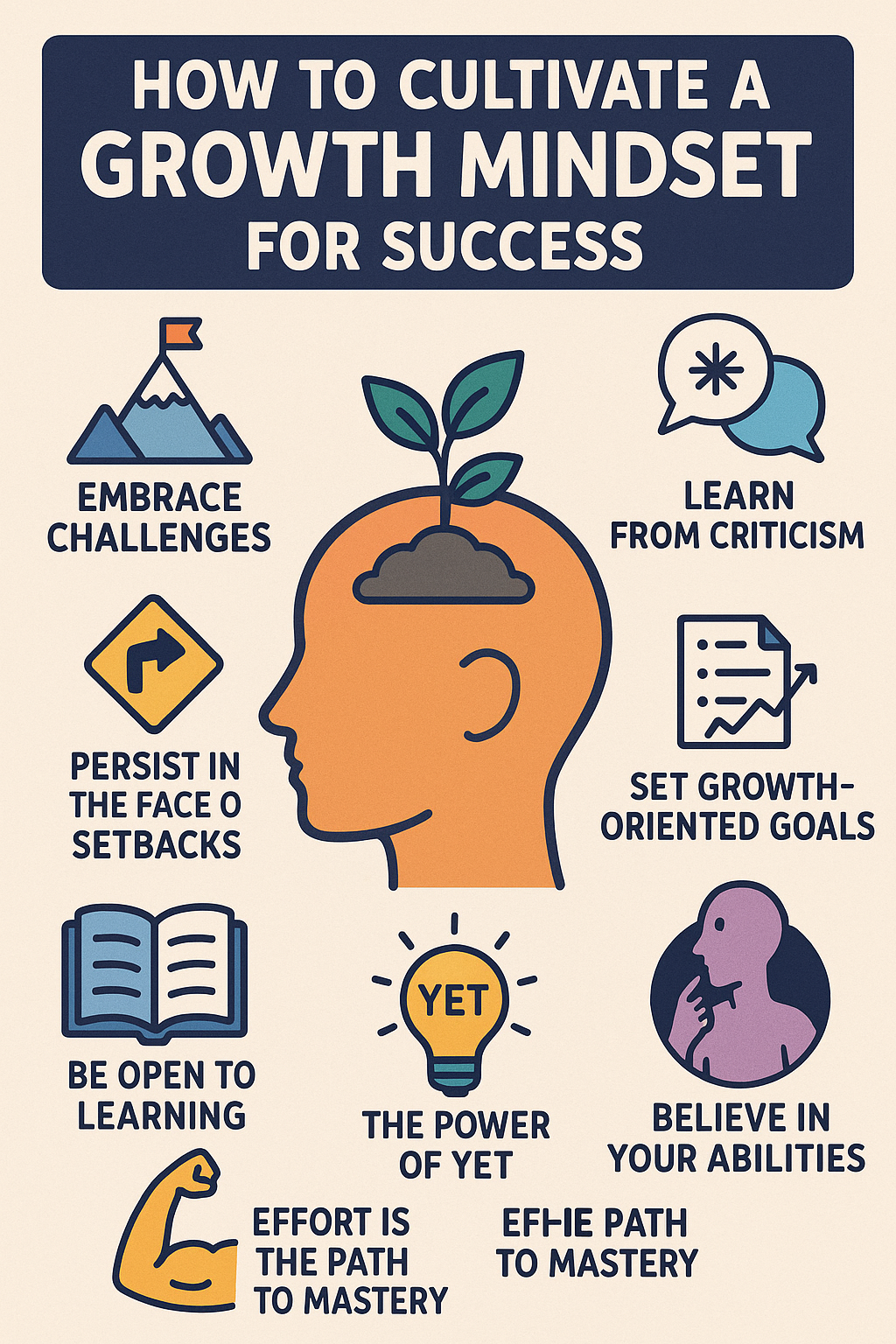A growth mindset is the belief that abilities and intelligence can be developed with effort, learning, and perseverance. This mindset is key to achieving long-term success, as it allows you to embrace challenges, learn from mistakes, and continuously improve. In this article, we’ll explore how to cultivate a growth mindset and why it’s crucial for your personal and professional success.
1. Embrace Challenges
People with a growth mindset are more likely to embrace challenges rather than shy away from them. They understand that challenges provide opportunities for learning and growth. When you approach challenges with an open mind, you become more adaptable and resilient, which can lead to greater success in the long run.
Tip: The next time you face a difficult situation, remind yourself that it’s an opportunity to learn and grow. See the challenge as a stepping stone rather than an obstacle.
2. Learn from Feedback
A key component of a growth mindset is the ability to learn from feedback, whether it’s positive or negative. Instead of taking criticism personally, view it as a valuable tool for improvement. Constructive feedback can provide insights into areas where you can improve and help you make better decisions in the future.
Tip: Actively seek feedback from others, and be open to it. Use feedback as a roadmap for personal growth and self-improvement.
3. Celebrate Effort, Not Just Results
In a growth mindset, the focus is on the effort you put into a task rather than just the outcome. By celebrating your efforts, you reinforce the belief that hard work and persistence lead to growth and success. This helps build motivation and fosters a sense of pride in your work, regardless of the immediate results.
Tip: Acknowledge the effort you put into your tasks, even if you don’t achieve the desired results. Take pride in your commitment to learning and improvement.
4. Replace “I Can’t” with “I Can’t Yet”
The language you use plays a big role in shaping your mindset. If you say, “I can’t do this,” you’re reinforcing the idea that your abilities are fixed. On the other hand, replacing “I can’t” with “I can’t yet” encourages the belief that, with practice and learning, you can eventually succeed.
Tip: Whenever you find yourself thinking or saying “I can’t,” change your perspective by adding “yet.” This simple change in language can help shift your mindset toward growth and possibility.
5. Focus on Learning, Not Just Performance
A growth mindset emphasizes the importance of learning rather than solely focusing on performance. People with a growth mindset understand that mistakes and failures are a natural part of the learning process, and they don’t define their abilities. Instead, they focus on acquiring new skills and improving over time.
Tip: When faced with a setback or failure, ask yourself, “What can I learn from this experience?” Shift your focus from the outcome to the process of learning.
6. Set Challenging, Yet Achievable Goals
Setting goals is essential for growth, but it’s important to make sure your goals challenge you without being unrealistic. A growth mindset encourages you to push beyond your comfort zone, but it also recognizes the importance of setting achievable milestones along the way.
Tip: Set SMART goals, Specific, Measurable, Achievable, Relevant, and Time-bound. Break them down into smaller steps to keep yourself motivated and focused on continuous improvement.
7. Cultivate Persistence and Resilience
Persistence and resilience are key qualities of a growth mindset. People with a growth mindset understand that setbacks and failures are part of the journey. They don’t give up when things get tough; instead, they use setbacks as learning experiences and keep moving forward.
Tip: When faced with challenges or obstacles, remind yourself that persistence is essential for success. Keep pushing forward and stay committed to your goals.
8. Surround Yourself with Growth-Minded People
The people you surround yourself with can significantly impact your mindset. By surrounding yourself with others who have a growth mindset, you create an environment of positivity, learning, and growth. These people can provide support, encouragement, and inspiration as you work toward your goals.
Tip: Seek out mentors, colleagues, or friends who share a growth mindset. Their mindset and attitude can influence your own and help you stay motivated on your journey.
9. Practice Self-Compassion
A growth mindset involves being kind to yourself during the learning process. Instead of being harsh or critical when you make mistakes, practice self-compassion. Recognize that mistakes are part of growth and give yourself permission to learn from them without judgment.
Tip: Be patient with yourself. When you encounter a setback, treat yourself with the same kindness you would offer a friend in a similar situation.
10. Focus on the Long-Term Journey
Success doesn’t happen overnight. With a growth mindset, you understand that growth is a long-term journey that requires time, effort, and continuous learning. Focusing on the long-term process rather than seeking immediate results helps you stay motivated and dedicated to your personal and professional development.
Tip: Remind yourself that growth takes time. Celebrate small milestones along the way, and remember that every step you take brings you closer to your ultimate goal.
